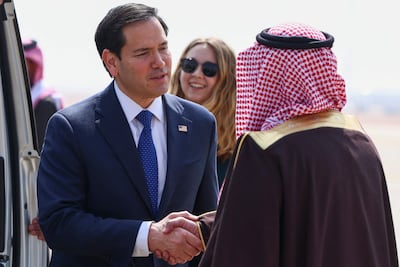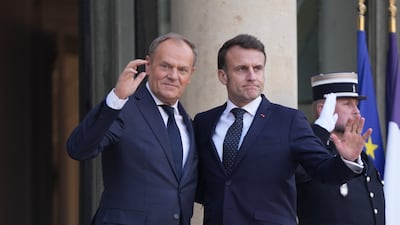European leaders sought to overcome differences over whether they should send troops to Ukraine at an emergency meeting on Monday in Paris before US-Russia peace talks begin in Saudi Arabia.
Leaders from the UK, Germany, Denmark, Italy, Poland, Spain and the Netherlands, as well as Nato Secretary General Mark Rutte, European Council President Antonio Costa and European Commission President Ursula von der Leyen, took part in the meeting.
There were suggestions that Europeans send troops to Ukraine, which most leaders treated with caution while others expressed their frustration. German Chancellor Olaf Scholz said he was "a little irritated" by such suggestions.
Any debate now on sending peacekeepers to Ukraine was "completely premature" and "highly inappropriate" while the war is continuing, Mr Scholz said after the Paris meeting.
UK Prime Minister Keir Starmer, who had said on Sunday in an opinion piece that he was ready to "put our own troops on the ground if necessary", called on security commitments from the US.
"There must be a US backstop because a US security guarantee is the only way to effectively deter Russia from attacking Ukraine again," Mr Starmer said.
Another key participant in the meeting, Polish Prime Minister Donald Tusk, called for increased defence spending. "We realise that transatlantic relations are in a new stage," Mr Tusk said.
Danish Prime Minister Mette Frederiksen said that European countries must increase defence spending to protect themselves against Russia. "Russia is threatening all of Europe now, unfortunately," Ms Frederiksen told reporters.
Monday's meeting may "be extended in other formats, with the aim of bringing together all partners interested in peace and security in Europe", the French presidency said in a statement.
The idea of sending troops to Ukraine led to a backlash when it was raised last year by French President Emmanuel Macron, but it appears to have gained traction in the past few days after indications that US President Donald Trump may negotiate a peace deal directly with Russia, while sidelining Europe and Ukraine.
While Russia's presence in Ukraine is viewed as a threat in Europe, most leaders have said they want to avoid the possibility of a direct confrontation with Moscow.
Speaking before the meeting, Spanish Foreign Minister Jose Manuel Albares said it was "too soon" to discuss sending its troops to Ukraine as part of any force.
"It is too early at the moment to talk about deploying troops in Ukraine. There is no peace at the moment, and the effort has to be to achieve it as soon as possible," Mr Albares told a joint news conference with visiting Brazilian Foreign Minister Mauro Vieira.
"When we have peace, we will have to see what conditions that peace requires. And whenever there is talk of any kind of deployment of forces, we have to consider what the mission is, who can make it up, under what flag, with what mandate," Mr Albares added.

French Foreign Minister Jean-Noel Barrot said at the weekend that it would fall to Europe to guarantee any peace deal in Ukraine, adding he expected the US to "revise their level of commitment to Nato, including in terms of geography".
The American policy shift "requires that we truly wake up, and even take a leap forward, to take our place for the security of the European continent", Mr Barrot said.
On Monday, US Secretary of State Marco Rubio landed in Saudi Arabia for talks with Russian officials as Russian media reported that Foreign Minister Sergey Lavrov and President Vladimir Putin's aide, Yuri Ushakov, were on their way to Riyadh.
Mr Trump's special envoy to Ukraine, Keith Kellogg, has said Europe would not be directly involved in talks on Ukraine, although it would still have "input".
Speaking in Brussels at a Nato meeting, Mr Kellogg said that no one would impose a peace deal on Kyiv and that questions about whether Washington would provide guarantees for any future European peacekeepers would be addressed later. Nobody will impose a deal "on an elected leader of a sovereign nation", he said.
The meeting in Paris comes after Mr Trump last week spoke to Mr Putin by phone and ordered senior officials to begin negotiations on the conflict, which he repeatedly vowed to end during his presidential campaign. The talks will be among the first high-level in-person discussions in years between Russian and US officials and are intended to precede a meeting between the US and Russian presidents.
Ukrainian President Volodymyr Zelenskyy is in the UAE to discuss the release of prisoners of war. He is also scheduled to visit Saudi Arabia and Turkey. On Sunday, he called for the creation of a European army, arguing the continent could no longer count on Washington.
In an interview broadcast on Monday, Mr Zelenskyy said that the US was trying to "please" Moscow in talks on Ukraine and warned of Europe's military "weakness".
Reacting to conciliatory comments towards Russia by US officials, he said: "The US is now saying things that are very favourable to Putin … because they want to please him."
"They want to meet quickly and have a quick win. But what they want – 'just a ceasefire' – is not a win," Mr Zelenskyy said in an interview on Saturday in Munich.


